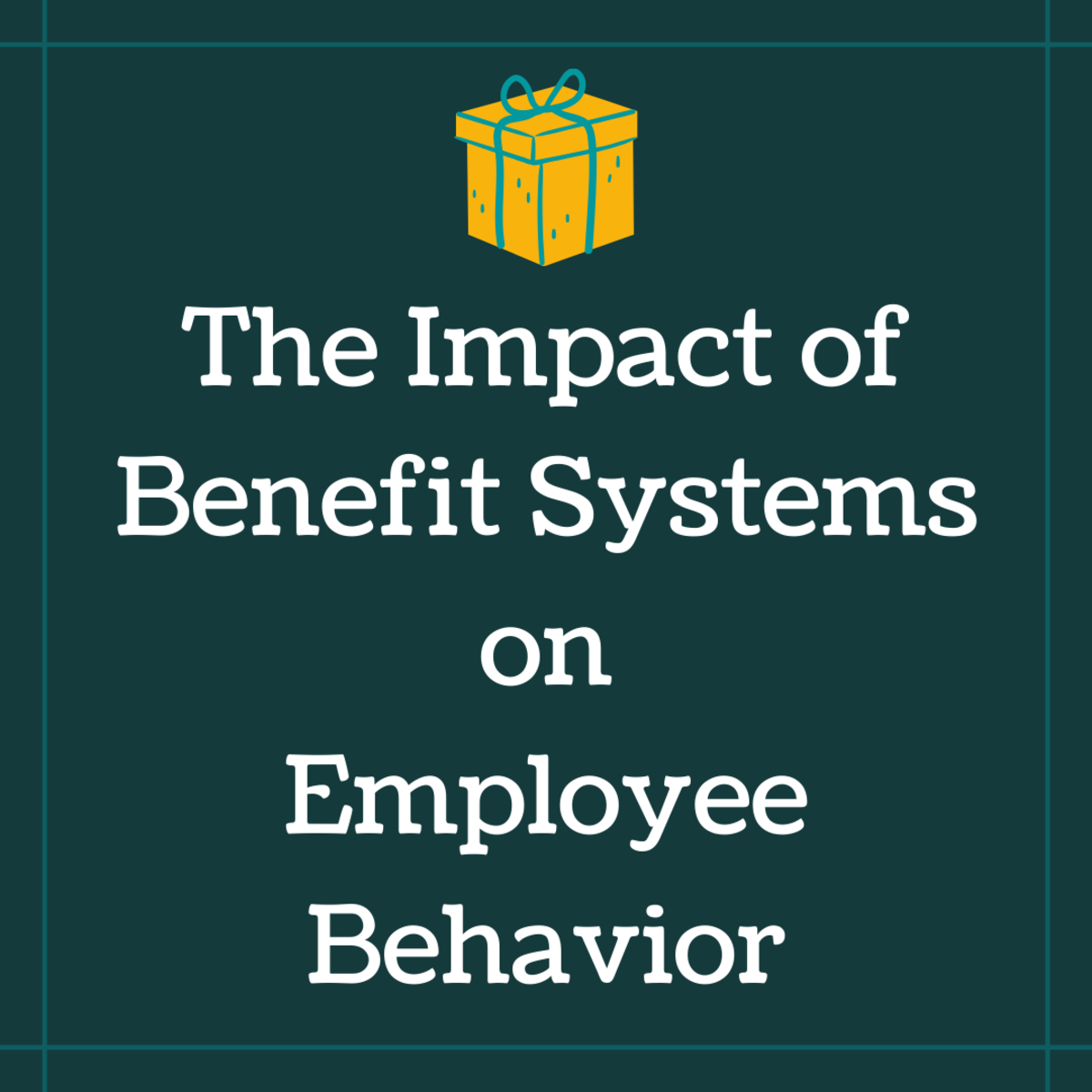Ways to Take Time Off Work: Sick Leave, Vacation, and Public Holidays

Types of Time Off from Work
Vacation, sick leave, holidays, and other types of time off can dictate how much time you can take off and if you get paid for it.
This article will cover a variety of leave types, while discussing the paid and non-paid options that may be made available to you.
Paid Vacation Time
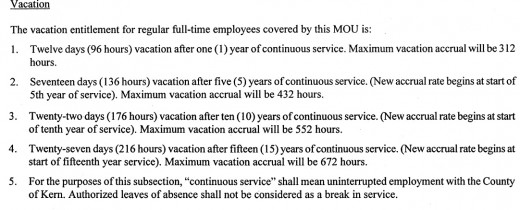
How much vacation time do you earn per year?
Vacation Time from Work
Vacation leave is something you earn over time with the organization you are with. This is the type of time off you will use when you need a day, week, or even a month off if you are lucky enough. Keep in mind the following when earning and using your vacation time:
- The longer you are with an organization, the more vacation time you could potentially earn. If you bounce from job to job to job, you won't see your vacation time grow.
- Some vacation time rolls over from year to year, some doesn't. With some companies your vacation time carries over to the next year, but with some you have to use it all by the end of the year, or you lose it. Other companies may pay out the time though.
- Ask for your time off sooner rather than later. Nothing is more annoying to a boss than someone asking for a week off from work the day before they want it, especially if it could have been done months ago.
- Build up your time. Try to build up your time. It will let you take more time off when you need it, and you will look good to your boss by not burning it all right away.
- Get approval in writing. If you ask for time off, do so in a memo or an e-mail and request that you receive a written response. If you are later disciplined for it, then having the approval in writing may save you.
- Don't assume you will get the time off just because you ask for it. While most good supervisors know their staff need time off, they also have to look out for the company. Just because you asked to take some time off for a vacation doesn't mean you automatically get it.
- You may or may not be paid. Just because you get vacation time doesn't mean you'll get paid for it. So find out ahead of time how it works before taking the time off.
- It can get you fired. If you end up taking too much time off, even if it's approved, then you could be fired for it. There could be procedures in place to prevent that, but some companies may not have a policy in place or they could fire you when they wish.
Paid Sick Leave
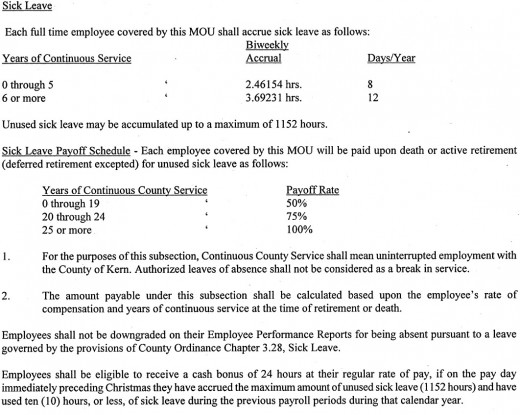
Do you receive paid sick leave at your workplace beyond what is required by law?
Sick Leave From Work
Sick leave is something considered to be more uncommon than vacation time. Some employers will pay you even when you are sick. This is useful for those 24 hours bugs, or more than likely, when you have the flu and need a week off to recover from it. Consider the following when having to use your sick leave.
- Calling in sick can be frowned upon. While typically illegal, some places still may fire you for this. So if you can, tough it out and go to work.
- Supervisors can keep track of how often you call in sick. If they see you calling in on a Monday once a month, they will see you are trying to stretch out a three day weekend using your sick leave.
- Don't earn and burn. Stock up your sick leave. If you end up in the hospital you will really need it then. Plus it looks good if you have a healthy stockpile of sick leave.
- Sick leave may be used for your family. You will have to check with your organization to determine if you can use your sick leave to cover for family illnesses, but if you can, only do it if it's serious.
- If you have to, use your sick leave. Nothing is worse than someone coming in and spreading your germs. A good supervisor will want you to stay home and get well rather than spreading your illness around.
- Invoke FMLA and other laws to take time off. The Family and Medical Leave Act allows employees to take time off for illness related issues, by law. While your job can be protected, your employer doesn't have to pay you for the time you take off.
- Some laws require employers provide sick leave. The Affordable Care Act, for example, requires employers provide three days of paid sick leave to their employees.
- Get a doctor's note. If you do go to the doctor, get a note stating you were excused from work due to an illness. Don't wait for your boss to ask for a note, have it ready to show you were legitimately sick.
Pregnancy and Maternity Leave

Have you had to take time off work for maternity leave?
Maternity Leave from Work
Almost all organizations allow people to take off for maternity leave. There are a few things to know about this type of leave:
- You may not get paid for it. Depending on the organization, you may be allowed to use your vacation time to cover for any time off.
- Dads can take off for maternity leave. I knew one dad who took off work when his wife was pregnant. It allowed him to be at the birth of his child.
- Keep your work updated. Let them know when you think you may be back to work, if the baby is past its due date, etc. This will allow your boss to further plan for your absence.
Holiday Leave
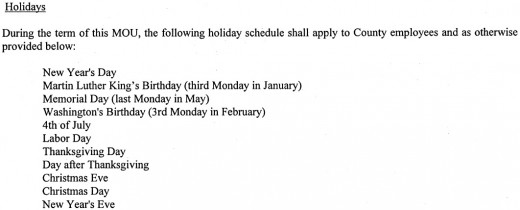
Do you like to work the holidays?
Holidays Off from Work
Some companies pay you for holidays, even if you take them off. Companies can gonvern what holidays you can take off and if you receive pay for them at all. Consider the following when it comes to holidays:
- You may not get paid. There are organizations out there that could have you take the holiday off, but you won't receive any pay for it. Mostly because business is closed that day.
- You may get paid more to work a holiday. If you are stuck working a holiday, you could find yourself earning holiday pay, which is a lot more money. Check your company policy before you volunteer to work a holiday.
- Everyone fights for the holidays off. Popular holidays, like Christmas and Thanksgiving, are holidays people typically want off. Depending on your hierarchy at work, you could find yourself with the holiday off or forced to work it.
Tables Showing How Employees Earn Time Off
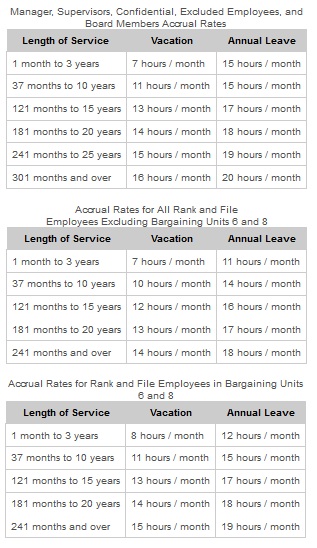
Other Types of Time Off from Work
There are other types of leave, which could be based on your position or how the organization does things. The image below shows an unusual way of handling leave, which is explained below:
- Different bargaining units receive different rates of time off. In the top box, managers, supervisors, etc. receive the most time off. While the other boxes show different bargaining units receiving lesser amounts of time off.
- Two different types of leave. An employee has a choice between the vacation time or annual leave. The vacation time guarantees the employee eight hours of sick leave per month. The annual leave doesn't offer the sick leave, but it does earn more time to use as sick leave or vacation time.
Time Off at Your Organization
In conclusion, you need to find out what type of leave is offered at your company or organization. While they should go over it with you at your new employee orientation, not all companies do so. I know I was left in the dark for awhile at my place of employment. There are a few ways to accomplish this on your own:
- Review your employee handbook.
- Talk to your HR department.
- Look on your company's internal or external website.
Enjoy your time off!
This article is accurate and true to the best of the author’s knowledge. Content is for informational or entertainment purposes only and does not substitute for personal counsel or professional advice in business, financial, legal, or technical matters.
© 2013 David Livermore



